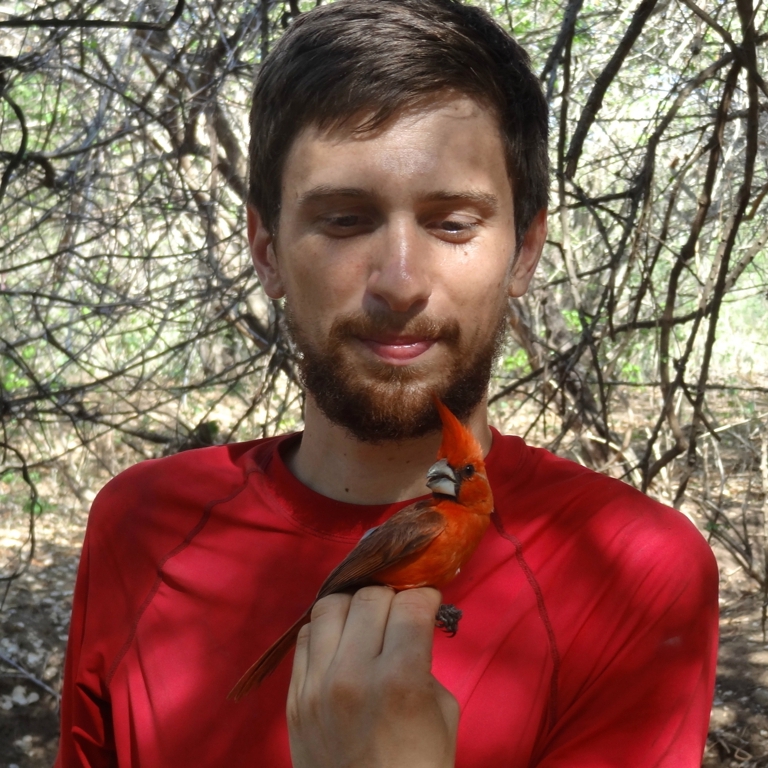EE Graduate Students
Personal Summary
My PhD research deals with two major questions... (1) why do species differ in how they spend their time and energy, and (2) what are the consequences of those differences? I address these questions through comparisons of life history traits across species and through experiments within species. My field research involves studying a community of songbirds at Mount Kinabalu in Sabah, Malaysian Borneo, and cavity-nesting songbirds in Missoula, Montana.
Here is a youtube video that I made about the birds at our study site at Mt. Kinabalu...
Education
PhD Candidate – Ecology & Evolution. University of Montana. 2018 – present.
MSc – Wildlife Ecology. Simon Fraser University. 2015.
BSc – Fish, Wildlife, and Conservation Biology. Colorado State University. 2011.
Teaching Experience
Teaching Assistant – BIOB161 Principles of Living Systems – University of Montana (Fall 2018, 2019, head TA in 2020, 2022)
Teaching Assistant – BISC102 General Biology – Simon Fraser University (Fall 2014)
Teaching Assistant – BISC304W Animal Ecology – Simon Fraser University (Fall 2012)
Field of Study
Life history theory, behavioral ecology, avian ecology, tropical biology, evolutionary ecology, conservation biology
Publications
ResearchGate profile. Google Scholar profile
Primary peer-reviewed publications
Forrester TR, DJ Green, R McKibbin, TC Morgan, AM Bezener, CA Bishop (2023). Long-term decline in Brown-headed Cowbird (Molothrus ater) abundance has not led to less brood parasitism of four riparian songbird species. The Wilson Journal of Ornithology 135(2):154-171. doi.org/10.1676/22-00074. (PDF download)
Forrester TR, TE Martin (2023). Riskiness of movement lifestyle varies inversely with adult survival probability among species. The American Naturalist 202(2):166-180. doi.org/10.1086/725056 (PDF download)
Knight EC [and 28 others, including TR Forrester] (2021). Comprehensive estimation of spatial and temporal migratory connectivity across the annual cycle to direct conservation efforts. Ecography 44(5):665-679. doi.org/10.1111/ecog.05111 (open access)
Forrester TR, DJ Green, R McKibbin, AM Bezener, CA Bishop (2020). Riparian habitat restoration increases the availability and occupancy of Yellow-breasted Chat territories but brood parasitism is the primary influence on reproductive performance. The Condor: Ornithological Applications 122(4):1-16. doi.org/10.1093/condor/duaa038 (open access)
Forrester TR, DJ Green, R McKibbin, CA Bishop (2017). Evaluating the efficacy of seasonal grazing and livestock exclusion as restoration tools for birds in riparian habitat of the Okanagan Valley, British Columbia, Canada. Restoration Ecology 25(5):768-777. doi10.1111/rec.12495 (PDF download)
Forrester TR, GA Londoño (2016). Breeding biology and egg temperatures of Black-faced Brush-finches (Atlapetes melanolaemus), Neotropical montane songbirds. Journal of Field Ornithology 87(3):260-272. doi10.1111/jofo.12155 (PDF download)
Other publications / databases
Barrera-Ocampo F, Forrester TR (2024). First predation record on a caecilian Caecilia sp. (Gymnophiona: Caeciliidae), by the poorly known Cauca Coralsnake, Micrurus multiscutatus (Squamata: Elapidae). Revista Latinoamerica de Herpetología 7(1):e795 (143-148). doi.org/10.22201/fc.25942158e.2024.1.795.
Forrester TR (2023). Bornean Whistler (Pachycephala hypoxantha), version 2.0. In Birds of the World (ND Sly, Editor). Cornell Lab of Ornithology, Ithaca, NY, USA. doi.org/10.2173/bow.borwhi1.02.
Forrester TR, P Clement (2022). Eyebrowed Jungle-Flycatcher (Vauriella gularis), version 2.0. In Birds of the World (SM Billerman, Editor). Cornell Lab of Ornithology, Ithaca, NY, USA. doi.org/10.2173/bow.eyjfly1.02.
Parra JL, J Sandoval-H, FE García, M Cortés, L Llano, TR Forrester (2016). Aves de fragmentos de Bosque seco en la region del Caribe Colombiano. 1386 registros. Grupo de Ecología y Evolución de Vertebrados – Universidad de Antioquia, Instuto de Investigación de Recursos Biológicos Alexander von Humboldt. doi.org/10.15472/yrjb5d.

